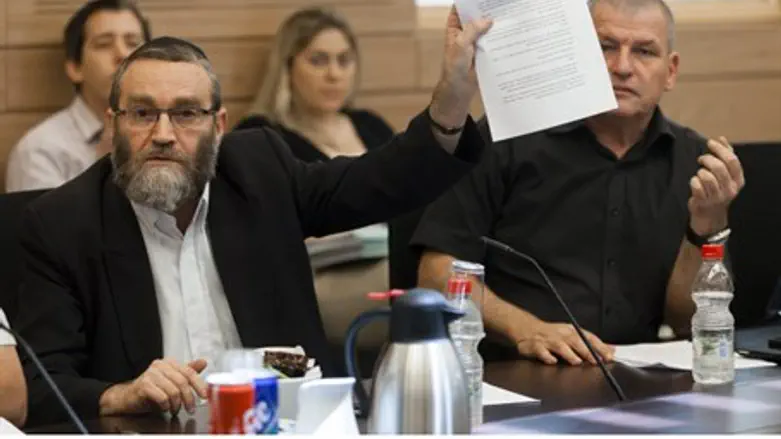
A plan to cut child payments led to a stormy debate Sunday morning in the Knesset’s Finance Committee.
Finance Minister Yair Lapid has proposed a cut to the automatic monthly stipend given to families with children as part of a round of cuts aimed at getting Israel’s deficit under control.
MK Moshe Gafni of the hareidi-religious Yahadut Hatorah (Gimmel) party accused Lapid of targeting child payments, specifically, due to the perception that the payments primarily benefit the hareidi-religious community and other communities with a high birthrate.
“We know Lapid wants to hurt the hareidi Jews. He should know that there are elderly hareidi Jews, not just children, so he could also cut payments for pensioners,” Gafni said.
“Don’t worry, hareidi Jews take care of each other, they will take care of the hungry children,” he continued. “But the child in Maalot or Tel Aviv who is hurt by this won’t have anyone to help him.”
MK Mickey Rosenthal of the Labor party joined Gafni in suggesting that Lapid’s dislike of hareidi Jews was to blame for the new policy. “His hatred for hareidi Jews has driven the Finance Minister out of his mind,” he accused. “You’re trying to push them out of Israel, and you won’t be forgiven.”
The proposed cut would “bury these people’s final chance to break out of the circle of poverty,” he warned, adding, “You’re burying people alive.”
MK Erel Margalit of Labor said, “Cutting child benefits means stealing food from their plates. This is an idiotic attempt to save money at the expense of children.”
Dr. Yitzchak Kadmon, director of the National Council for the Child, expressed strong opposition to the proposed cut as well. “There is no country in the Western world that taxes raising children,” he said.
“The child benefit is not welfare and is not a free payment, it’s a tiny boost to families considering the costs of raising a child,” he argued.
“This cut will mean a significant increase in the number of children living under the poverty line,” Kadmon added.
MK Reuven Rivlin (Likud) joined in the criticism. “The cut to child payments is one of the most dramatic and harsh parts of the current budget. For many families, this is a significant part of their monthly income, used for buying bread and other basic goods,” he warned.
“I understand the significant savings to the budget – 3 billion shekels – and the need to help sectors of society to join the workforce,” he continued. “But a child is a child, even if his parents are guilty of something.”
“Se even if we have to make a cut, it should not be sudden and drastic, but rather spread out over time,” he proposed.
Rivlin also suggested cutting child payments only for more wealthy Israelis, “so those with high earnings give some back to the state, while low earners and the middle class get the full payment.”